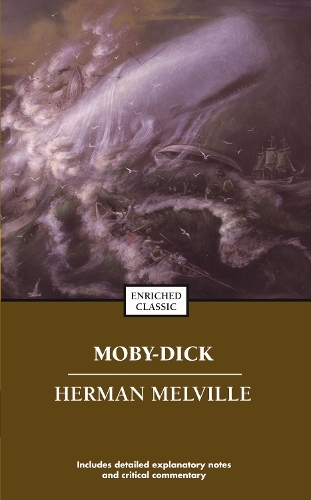
Moby-Dick
(Paperback, Enriched Classic)
Available Formats
Hardback
Published: 2nd December 1991
Hardback
Published: 11th October 2016
Paperback
Published: 23rd May 2012
Paperback, Enriched Classic
Published: 15th April 1999
Paperback
Published: 9th April 2014
Paperback
Published: 3rd September 2007
Hardback
Published: 13th January 2014
Paperback, 2nd Edition
Published: 16th April 2025
Hardback
Published: 1st February 2025
Paperback
Published: 15th December 2000
Hardback
Published: 20th November 2013
Paperback
Published: 13th January 2010
Paperback
Published: 21st February 2003
Publishing Details
Moby-Dick
By (Author) Herman Melville
Simon & Schuster
Pocket Books
15th April 1999
Enriched Classic
United States
Classifications
Tertiary Education
Non Fiction
813.3
Physical Properties
Paperback
640
Width 106mm, Height 171mm, Spine 38mm
397g
Description
Enriched Classics offer readers accessible editions of great works of literature enhanced by helpful notes and commentary. Each book includes educational tools alongside the text, enabling students and readers alike to gain a deeper and more developed understanding of the writer and their work.
Herman Melville's peerless allegorical masterpiece is the epic saga of the fanatical Captain Ahab, who swears vengeance on the mammoth white whale that has crippled him. Often considered to be the Great American Novel, Moby-Dick is at once a starkly realistic story of whaling, a romance of unusual adventure, and a searing drama of heroic courage, moral conflict, and mad obsession. It is world-renowned as the greatest sea story ever told.
Moby-Dick, widely misunderstood in its own time, has since become an indubitable classic of American literature.
Reviews
D.H. Lawrence Moby-Dick commands a stillness in the soul, an awe...[it is] one of the strangest and most wonderful books in the world.
Author Bio
Herman Melville was born in 1819 in New York City. After his father's death he left school for a series of clerical jobs before going to sea as a young man of nineteen. At twenty-one he shipped aboard the whaler Acushnet and began a series of adventures in the South Seas that would last for three years and form the basis for his first two novels, Typee and Omoo. Although these two novels sold well and gained for Melville a measure of fame, nineteenth-century readers were puzzled by the experiments with form that he began with his third novel, Mardi, and continued brilliantly in his masterpiece, Moby-Dick. During his later years spent working as a customs inspector on the New York docks, Melville published only poems, compiled in a collection entitled Battle-Pieces, and died in 1891 with Billy Budd, Sailor, now considered a classic, still unpublished.
